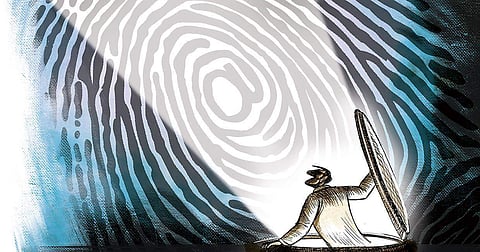

It’s time to accept that the debate about privacy is now just an academic exercise in futility. We have traded it in for the convenience and glamour of technology, and no amount of carping will restore it. Under public pressure, governments will no doubt make laws to try to protect it from corporate attacks; but the irony is that in this matter the interests of the state and the market converge, for reasons of security and profit, respectively. Forget about Aadhaar and biometrics—these are rudimentary prototypes of what the algorithms of Artificial Intelligence (AI) have in store for us.
Take facial recognition: It provides many times the information that an identity card does, works at a distance without invading your privacy physically, and anyone with a camera and the required software will instantly know more about you than you yourself do. Facial recognition software already exists that can develop ‘faceprints’, which can then be ‘algorithmised’ and with a reasonable degree of accuracy, predict our sexuality (homosexual or heterosexual), IQ level, personality, ailments or predisposition to gene-related disorders such as Down syndrome or depression.
And the frightening thing is that the more data AI crunches, the more proficient and accurate the algorithms become in detecting and correlating patterns, and in digging up more information. This ‘machine learning’ improves geometrically the more data it has access to. Combined with online information about a person which already exists in various apps, it will soon be able to spot traits that will reveal your political views, consumer preferences and criminal tendencies. Even your Aadhaar number can be discovered by matching facial recognition with online information.
Businesses abroad are already using facial recognition technology to track you in stores, find out your shopping preferences and then target ads at you. They can similarly delve into your creditworthiness and soon, by simply looking at you, a bank manager would be able to assess whether you should be given a loan or not. By building up data banks over time, stores can instantly identify shoplifters, regular customers and troublemakers.
The state is not to be left behind in this race either. Faces in a crowd can be matched against data banks in a nanosecond to spot convicted criminals or wanted persons. There are even rumours about a ‘smart bullet’ that is ‘trained’ to home in on a particular face, just as cruise missiles are guided to a precise location by GPS and photographed data of the terrain. There are more positive uses of this wonder technology too, as in the field of healthcare. Research has shown that some genetic diseases leave typical physical imprints on faces or the shapes of skulls: AI algorithms are becoming proficient at diagnosing them through facial recognition. An American company has already developed an app called Face2Gene which does precisely this: it is used by doctors in 130 countries.
What is of particular concern, however, is how the state can use apparently innocuous online data about you for its own surveillance ends. Ostensibly harmless data about you on Facebook, WhatsApp, Tencent, Amazon and any of the other three million available apps can be collated by governments to build a 360-degree profile of you and use it for surveillance purposes. China has already progressed some way on this. It has started assigning ‘social scores’ to citizens, using data generated by a person every time he shops online, takes a Uber cab, draws money from an ATM, orders in food, converses on social media or pays a pending utility bill.
A person’s behaviour, as revealed by these transactions, will enable the government to build up a Social Credit Rating score for a citizen, which can then be used to reward or blacklist him. It has been reported that till May this year, using these scores, the Chinese government blocked 11.14 million people from boarding flights and 4.25 million from taking high-speed trains.
This type of information can be used in future by non-democratic regimes to deny employment, voting rights, purchase of properties and credit. And this becomes more pervasive over time: If you associate with people with ‘low scores’, your own social credit rating can be affected. In the near future, the state might be in a position to record and monitor a person’s emotions or moods over various occasions, events and times, and thus find out whether you are patriotic and support the Great Leader, or are angry with the government’s policies and rebellious. It is not hard to imagine to what use this intimate information will be put to. Over time, AI will become a tool of coercive control and will be used to discipline citizens to conform to standards set by the state.
The new mantra for invasion—actually, ‘takeover’ is a better word—of privacy is national security. Our own government’s obsession with it is a matter of concern: The straws in the wind are not encouraging. It is significant that the new draft Privacy Bill proposed by the Srikrishna Commission has a clause which exempts the government from taking consent of the individual before accessing his personal information.
The government has also proposed a law which will make DNA profiling of every citizen mandatory and has now asked Facebook, WhatsApp, Instagram and Telegram to suggest how these services can be blocked in certain exigencies. This can be dangerous for individual liberty in a country where even a speech in a university or a cartoon in a newspaper or a gig by a stand-up comedian is charged as sedition. So, move over Aadhaar, the big boys have arrived.